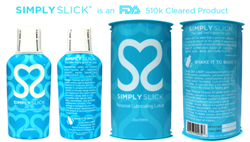Manufacturers of Simply Slick Comment on Recent FDA Changes and World Health Organization Findings on Personal Lubricants. Is Safe Sex Safe?
Saturday, November 29th, 2014
Janesville, Wisconsin (PRWEB) November 21, 2014
Recent research by the World Health Organization (WHO) [1] suggests that many conventional personal lubricants may actually be putting users at higher risk of contracting sexually transmitted diseases. These findings have triggered a new round of FDA reviews for all personal lubricants being sold in the United States. By December 31, 2015, the FDA will re-review all devices subject to a PMA (Premarket Approval) which includes Personal Lubricants. [2]
The review of the personal lubricant category has drawn comparisons to early investigations into smoking safety. In 1964, the Surgeon General of the US Public Health Service linked higher rates of lung cancer to the widespread use of cigarettes. The World Health Organization’s recent investigations have found similar links between the rapid spread of AIDs in Africa and the mass distribution of condoms and condom safe lubricant – a conclusion that on the surface seems contradictory. [1]
Key ingredients in many conventional personal lubricants are the same as those used in products designed to push a dosage of drug into the body through formats such as “the patch”. As an example, such devices are used to discharge nicotine into the body through a nicotine patch. Thus, one hypothesis is that the lubricant actually contains ingredients that facilitate the passage of STDs through the protective wall of the area rubbed against during sex. [3]
Just as the safety of cigarettes was called into question in the sixties, consumers today need to be aware of the potential link between STDs and the lubricant they take to bed.
The category review is underway, and we can expect to see fewer personal lubricants on the shelf at the end of 2015. To achieve FDA clearance, lubricant manufacturers must pass comprehensive laboratory tests. These tests are designed to ensure that the product meets the appropriate provisions of the Federal Food, Drug and Cosmetics Act for good manufacturing practice, labeling and prohibitions against misbranding and adulteration. All Personal Lubricants must have an FDA 510(k) clearance before they go to market. [4]
The first natural product to achieve FDA clearance under the new protocols is an organic, oil-based, and condom-safe, personal lubricant called Simply Slick, a newcomer brand that has already condemned mainstream manufacturers for putting profit before people – a complaint that could become more mainstream with increased consumer awareness. [5]
What else does the FDA know about the inadequacies of the personal lubricant category? Why has it taken so long for us to question the safety of personal lubricants, a product that is regularly used by millions of Americans? Did the manufacturers know about this and choose to ignore it? [6] [7]
In a study performed by the CSHP at the School of Public Health in Bloomington at Indiana University, they determined that an estimated 65% of women and 70% of men have used a personal lubricant. [8] Consumers need to seriously question their product choices. Don’t put yourself at risk under the pretense that safe sex is really safe.
Contacts
Rob Leary
Simply Solutions LLC
608-563-5556
robl(at)simplyslick(dot)com
http://www.simplyslick.com
http://www.youtube.com/watch?v=pzceav5dQGY
SOURCES:
[1] apps.who.int/iris/bitstream/10665/76580/1/WHO_RHR_12.33_eng.pdf
[2] fda.gov/AboutFDA/CentersOffices/OfficeofMedicalProductsandTobacco/CDRH/CDRHVisionandMission/ucm384132.htm
[3] ncbi.nlm.nih.gov/pmc/articles/PMC3161103/
[4] fda.gov/medicaldevices/deviceregulationandguidance/howtomarketyourdevice/premarketsubmissions/premarketnotification510k/default.htm
[5] accessdata.fda.gov/scripts/cdrh/cfdocs/cfPMN/pmn.cfm?ID=K140304
[6] aboutlawsuits.com/k-y-recall-42469/
[7] justice.gov/opa/pr/justice-department-sues-los-angeles-pharmaceutical-company-over-feminine-health-drug-products
[8] stdcentral.org/SHC/SHC_Reece.pdf
[9] cen.acs.org/articles/90/i50/Studies-Raise-Questions-Safety-Personal.html
